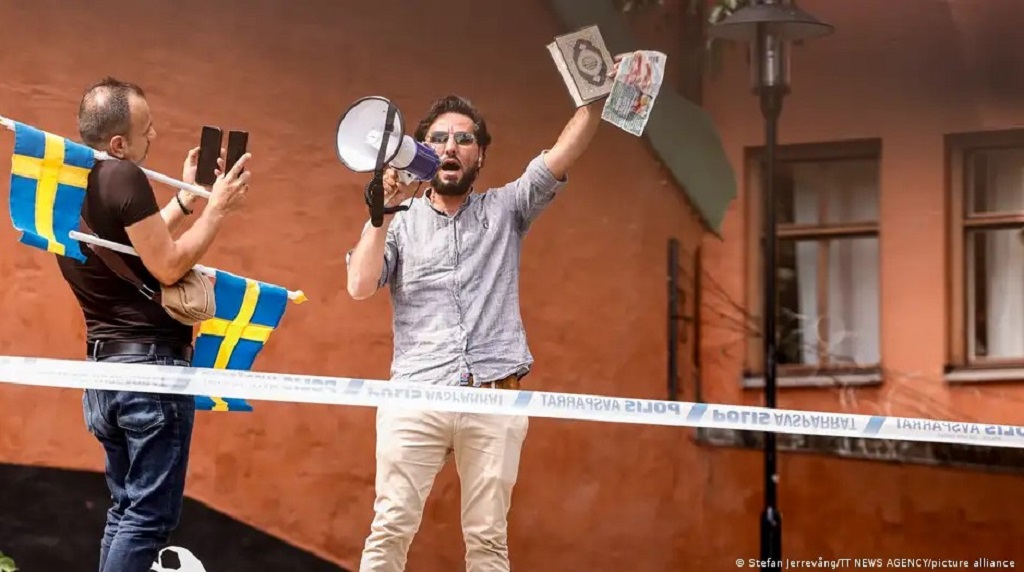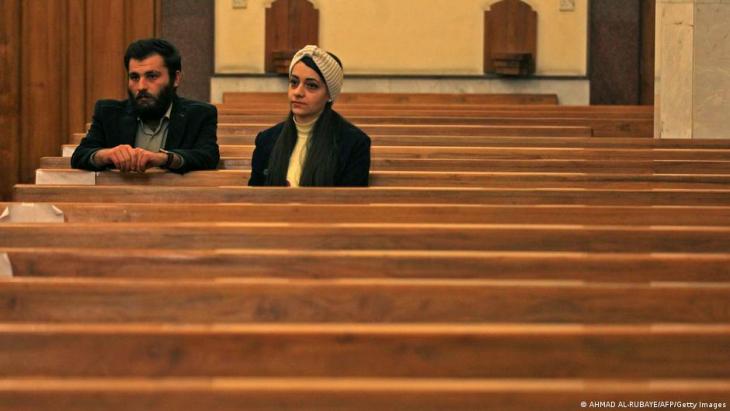The Iraqi Christian turned radical

He tore pages out of the Koran, threw them on the floor and stomped on them. Then he opened a pack of bacon, put a slice in the spine and set fire to the Muslim holy book in his hands. Pork is absolutely taboo for Muslims. It all took place on the first day of the Islamic feast of Eid ul-Adha in front of a mosque in the Swedish capital Stockholm, in the immediate vicinity of the Turkish embassy. The action could not have been more symbolic. Turkish President Recep Tayyip Erdogan reacted immediately and once again threatened to block Sweden's accession to NATO.
Time and again, Koran burnings in Western countries have caused a stir. Outbursts of rage, demonstrations the boycott of goods in Islamic countries are usually the result. The Muhammad cartoons in a Danish newspaper in 2015 even resulted in terrorist attacks and for months there was no Danish butter in the supermarkets of the Middle East.
In Sweden, too, there had already been Koran burnings in 2020 and 2021. The issue has always been seen as a culture war: freedom of expression against dictatorship of opinion. But this time it is different. The person responsible for the Koran burning in Stockholm was not a citizen of a Western country, but an Iraqi.
Some say Salwan Momeka did not know what he was doing. The 37-year-old is Assyrian and belongs to the Christian minority of the multi-ethnic state. He himself says he is an atheist, probably out of consideration for his family, who are still in Iraq and now face powerful hostility. His father has already officially distanced himself from him.

Situation extremely difficult for Christians in Iraq
Momeka's actions have discredited Christians enormously. In social media, they are being vilified as seldom before. One person who is following reactions on the Internet closely is Mithal al-Alusi, former member of the Iraqi parliament and founder of the Umma Party, which calls itself liberal-democratic.
"The Christians in Iraq are utterly confused and frightened," Alusi commented on the situation. "They are either completely distancing themselves from the Islamic atmosphere that characterises politics and life in Iraq, or they are courting the Muslim parties and militias, even linking up with the Iranian Revolutionary Guard."
Christians have indeed become something of a rare breed in Mesopotamia. Their number has more than halved since the American and British invasion 20 years ago. Of the 1.2 million that once lived there, barely half a million remain. The perpetrator also left Iraq five years ago. By his actions, he has done a disservice to his Christian compatriots. It is to be feared that even more will emigrate now.
Others believe Momeka knew very well what he was doing. In a video posted online the day after he burned the Muslim holy book, he makes his motives clear. It is not his "Muslim brothers and sisters" who prompted him to act, but the Shia religious hardliners, first and foremost Muqtada al-Sadr.
The latter had threatened to kill him. He also accuses Iran of exploiting his country for years, stealing money and oil and oppressing the people. "You have nothing but empty words to say," he says to his compatriots, "you are cowards. He is not afraid, he adds, "no matter how many of you there are".
Iraq has called on Sweden to extradite Salwan Momika, an Iraqi who burned the Quran outside a Stockholm mosque this week. It comes after Iraqi protesters breached Sweden's embassy in Baghdad yesterday, spraying "Yes, yes to the Quran" on the compound's gates
: @Reemkhabbazy pic.twitter.com/v55DLiZYg3— The New Arab (@The_NewArab) June 30, 2023
Protests in front of the Swedish embassy
For two days, supporters of al-Sadr gathered outside the gates of the Swedish diplomatic mission in Baghdad, carrying posters with the likeness of al-Sadr and other Shia clerics, demanding Momeka's extradition to Iraq and the revocation of his Swedish exile. The Iraqi Supreme Court has already sent an extradition request to Stockholm.
Meanwhile, demonstrations have also taken place in front of the Swedish embassy in Tehran. Iran will not send an ambassador to Sweden for the time being, according to official sources in Tehran, although diplomatic relations between the two countries were set to resume shortly after a long hiatus. Shia Grand Ayatollah Ali al-Sistani in Najaf, Iraq, also held Sweden primarily responsible for the Koran burning.
In a letter to UN Secretary-General Antonio Guterres, Sistani's office condemned the Swedish police's authorisation of the action.
Yet Momeka's biography sheds light on the background to his crime. He was born in Qaraqosh, a Christian town halfway between Mosul and the Kurdish metropolis of Erbil. Salwan was 20 years old when the extremist Sunni terrorist organisation al-Qaida was wreaking havoc in Iraq and calling for the persecution of Christians.
Back then, the terrorists drove through Mosul with megaphones, demanding that Christians leave the city or pay a poll tax laid down in the Koran, Sura 9, for non-Muslims. Qaraqosh, Salwan's hometown, swelled from a previous population of 15,000 to over 40,000. Christians under threat moved to Qaraqosh from all over the country. The Kurdish peshmerga promised to protect the town.
⭕️عاجل: مكتب السيد السيستاني (دام ظله) يستنكر جريمة حرق القرآن التي حدثت في السويد ويطالب الأمم المتحدة باتخاذ خطوات فاعلة لمنع تكرار هذا الفعل#العتبة_العباسية_المقدسة pic.twitter.com/ouwZdDYXbZ
— العتبة العباسية المقدسة (@AlkafeelAbbas) June 29, 2023
Radicalised by war
Momeka became a security guard at the Assyrian Democratic Party headquarters. In 2014, in August, IS came, the Kurdish security forces disappeared and left the Christians to fend for themselves. Fortunately, almost all the inhabitants managed to flee; the town was empty when the jihadists overran it. Many Christians fled to Ain Kawa, a suburb of Erbil, and applied to leave the country to find refuge in the USA or Canada.
Momeka went on the offensive and joined the Shia militias. He founded an armed Christian faction – Suqur al-Suryan – in alliance with the Popular Mobility Front, which fought against IS with Iranian support. His spiral of radicalisation continued. While he initially paid homage to the Iranian-dominated militia leaders, as evidenced by videos and tweets, he later came increasingly into conflict with them. He is said to have been imprisoned in Badush prison north of Mosul for three years following a self-inflicted car accident.
An internal paper from the Swedish embassy in Baghdad to the Iraqi Foreign Ministry, made available to the Qantara editorial team, states that Salwan Momeka joined the ultra-right Sweden Democrats after fleeing to Sweden. It states that he burned the Koran on two occasions in the Sodermalm district of Stockholm: at 1.30 p.m. on 28 June and at 6 p.m. on 29 June.
In the meantime, the Iraqi has announced that he intends to repeat the action a third time. Next week, he will burn the Iraqi flag and the Koran in front of the Iraqi embassy in Stockholm. The Swedish police are now investigating him on charges of sedition.
© Qantara.de 2023
